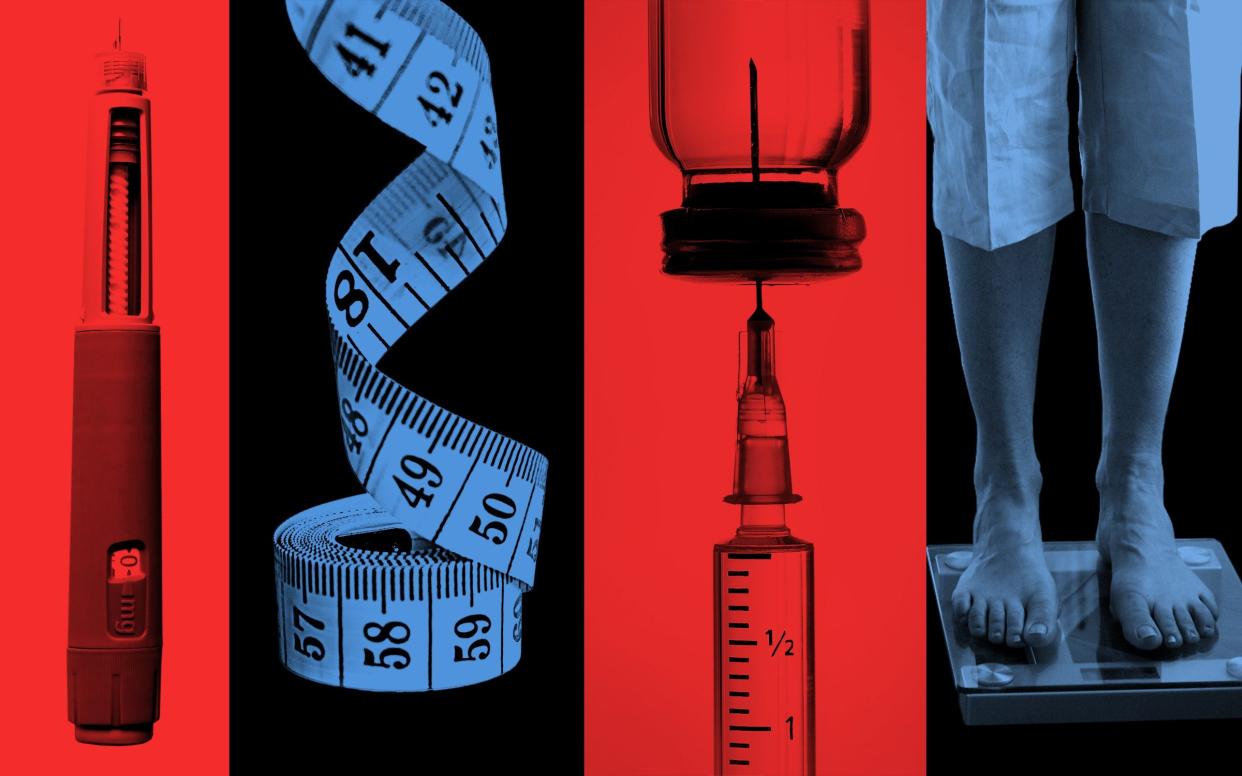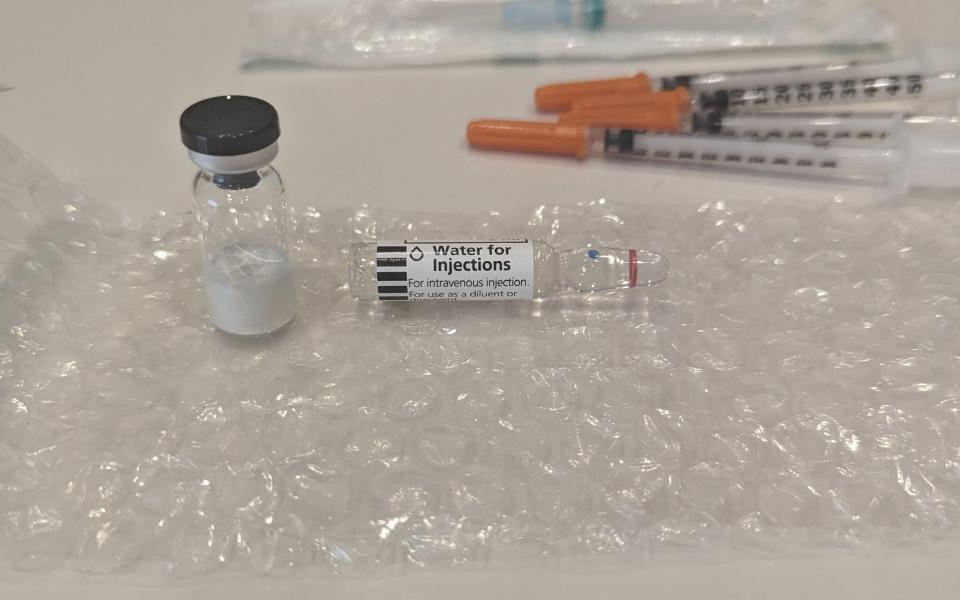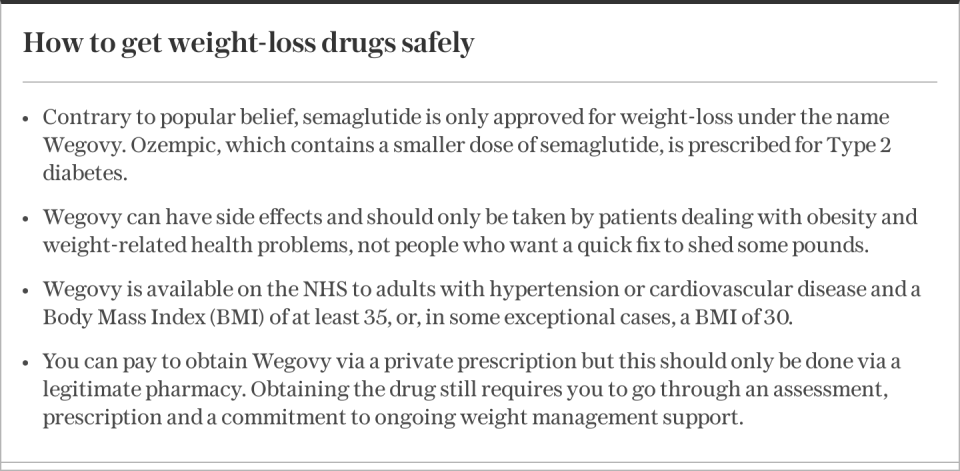‘I woke up paralysed, with no speech’: Inside the weight-loss drug black market

The World Health Organisation (WHO) has issued a global alert about the potential dangers posed by fake versions of blockbuster weight-loss drugs such as Wegovy, Mounjaro, Saxenda, and Ozempic, the latter of which is medically prescribed for Type 2 diabetes.
The WHO’s decision follows a growing number of reports of people being hospitalised and even dying after inadvertently buying counterfeit versions of the popular drugs, either through social media, fake online pharmacies or medical spas and wellness centres.
The hype surrounding these drugs has fuelled a thriving black market with potentially deadly consequences. As of March 31, US regulators revealed that they had received 100 reports of people becoming ill after injecting themselves with what they believed to be tirzepatide, the drug within Mounjaro, or semaglutide – the key ingredient in Wegovy and Ozempic. Several of these cases were life-threatening and at least two people died.
Last autumn, the UK Medicines and Healthcare products Regulatory Agency (MHRA) revealed that they had seized hundreds of fake jabs, purporting to be Ozempic, while the Austrian Federal Office for Safety in Health Care (BASG) revealed that a number of people have been hospitalised with seizures and life-threatening hypoglycemia after using Ozempic jabs that turned out to be fake.
I had already discovered myself how remarkably easy it is to order a product claiming to be semaglutide, with zero checks or verifications required. In August 2023, I discovered an Instagram influencer with 143,000 followers, blue-tick-verified by the platform who was claiming to sell both Ozempic pens and a semaglutide diet kit.
For the sum of £200, a package arrived a few days later. It lay open on my kitchen table – a collection of syringes and a small, unmarked glass vial containing what was supposedly semaglutide, the key ingredient of the blockbuster weight-loss drugs Wegovy and Saxenda, as well as Ozempic, which is medically prescribed for Type 2 diabetes, and instructions on how to mix and inject it.
This activity exists in a legally grey area, and there are many such beauty and cosmetics influencers attempting to make quick money from obtaining and selling forms of semaglutide. But concerns are growing about the sources of such products, and whether they may place unwitting consumers in danger.
Chemical analysis has recently revealed that some fake Mounjaro products have actually contained bacteria and completely different chemicals to the real drugs. In an attempt to clamp down on the problem, Eli Lilly, the pharmaceutical company and manufacturer of Mounjaro, has now launched multiple lawsuits against various wellness centres accused of allegedly selling fake or compounded versions of Mounjaro.

“Novo Nordisk [a global healthcare company, and maker of Ozempic] has been made aware that some of its products in the UK have been falsified and are not legitimate semaglutide injection products,” a Novo Nordisk spokesman told The Telegraph. “The content of the falsified pens can be entirely different from the genuine medicine and should not be used, as they pose a risk to patient safety. Some falsified Ozempic pens that we have been made aware of can be identified by the scale indicator and the dose selector, which differ from the genuine product.”
“The access to these products is too readily available on social-media platforms, and there doesn’t seem to be enough regulation in this space to counter that,” says Oksana Pyzik, a lecturer at the UCL School of Pharmacy and the founder of the organisation Fight the Fakes. “I think there needs to be more education on the fact that if you’re not being asked for a prescription, it’s unlikely to be legitimate.”
The hype that has surrounded Ozempic and Wegovy in the past 12 months, fuelled by glowing endorsements from celebrities such as Elon Musk, has sent demand spiralling. As well as giving Novo Nordisk a net worth of $430 billion, it has resulted in global shortages of both drugs, giving rise to a lucrative black market fraught with dangers.
In July, Jennifer Finestone, a Glasgow-based beauty therapist, decided to purchase what she believed to be Saxenda from a private seller on Facebook Marketplace. “I woke up paralysed, with no speech and unable to move, which went on for about an hour,” she wrote on Facebook. “I was referred to A&E and went through various tests, to be told I’d suffered a transient ischaemic attack, or mini stroke. Absolutely terrifying.”
It transpired that the version of Saxenda she had bought was fake. Instead of semaglutide, it contained insulin, a substance that can lead to fatal overdoses. While Finestone ultimately recovered, with no lasting damage, insiders within the weight-loss industry believe it is only a matter of time before someone suffers permanent brain damage – or worse – through taking an illegally sold drug.
“There’s not a lot of these stories emerging yet, because people are quite secretive,” says Jill Smith, a qualified nurse who runs the Platinum Medi Cosmetic Clinic, in West Lothian, Scotland, which is authorised to prescribe medical weight-management solutions. “The suppliers have their home address, so they’re worried about the repercussions of going public. But my fear is that someone is ultimately going to die.”
In an attempt to understand the terrifying ease with which consumers can order products purporting to be legitimate weight-loss drugs from sellers on social media, I took to Instagram. Almost immediately, I was able to enter into negotiations with a man named Kostya.
He offered to send me a month’s supply of Wegovy for £120, including shipping costs. After I had transferred the funds, the agreement suddenly changed and Kostya asked for an additional £150. “We only do two months’ supply at a time,” he wrote. “We need £150 to proceed.” When I refused, he simply blocked me and deleted the account. Similarly-named accounts would later appear.
Seeking evidence that the illegal weight-loss-drug industry encompassed more than just opportunistic scammers, I began messaging a woman called Pippa (she preferred not to disclose her real name for fear of reprisals), who said she had been sold an Ozempic pen that turned out to be fake.
“I wanted a bit of a boost with my weight loss, but when I received the pen in the post, I sent a photo of it to a friend who was already using Ozempic, and she said it didn’t look right,” Pippa wrote. She claims then to have contacted Novo Nordisk, which checked the batch number and confirmed it was a fake.
Pippa said she was ultimately refunded by the seller.
UCL pharmacologists suggested to The Telegraph that, in some cases, online vendors may be getting their hands on semaglutide vials that are intended for research purposes, rather than human consumption. “It’s possible,” says Pyzik. “Usually in that instance, it means it’s been diverted or stolen, and it’s not the same thing as clinical grade. That could be because it’s in its raw form, and so people are putting themselves at risk. This usually happens when there’s a shortage.”
When I first approached the seller, he claimed to have “raw peptide semaglutide kits”, and sent the testimonial of a woman called Shannon who claimed to have lost 4 and a half stone using them, as well as a video and instruction guide to mixing the ingredients and injecting them. “You mix them up and keep in the fridge,” he wrote via Instagram direct message. “It’s amazing, it cuts your appetite right down.”
Smith described the kits as a likely example of compounding, where unscrupulous pharmacies manufacture a version of semaglutide themselves using the raw ingredients. “It’s not just fake pens, there’s a lot of this compounding as well coming into the UK,” she says. “But you don’t know anything about that pharmacy, what their processes are, if it’s a clean-room [controlled] environment and what the manufacturing is,” she says.
But compounding is on the rise around the world. Earlier this month, the US Food and Drug Administration issued a stark warning, recommending that patients do not use compounded versions of weight-loss drugs.
According to Smith, such pharmacies are increasingly contacting beauty salons directly via cold calls, offering their products for sale, exploiting a grey area in the regulations that currently makes it hard for the authorities to take action. “I’ve received emails from a German company selling their compounded semaglutide, and asking if I would be interested in a partnership,” she says. “The issue is that there are no strict regulations with regards to prescribing semaglutide at the moment. It’s a huge unregulated loophole, and it’s not being policed. It’s like the Wild West.”
The MHRA told The Telegraph that it is taking steps to identify those unlawfully trading in medicines. “Buying semaglutide, or any medicinal product, from illegally trading online suppliers significantly increases the risk of getting a product which is either falsified or not licensed for use in the UK,” says Dr Alison Cave, MHRA’s chief safety officer. “Purchasing from illegal suppliers means there are no safeguards to ensure products meet our quality and safety standards, and taking such medicines may put your health at risk.”

Pyzik believes that more pressure needs to be put on social media companies to crack down on these illicit sales; while Mike Isles, the executive director of the Alliance for Safe Online Pharmacy organisation, is pushing for the introduction of “pharmacy” domain names to make it easier for the general public to find legitimate official online vendors. “It is an undisputed fact that European citizens are put in harm’s way as the sale of falsified and substandard medicines is rampant and growing on the internet,” says Isles.
Smith says she has already heard growing numbers of stories where individuals have bought versions of Ozempic or other semaglutide drugs from beauty therapists, resulting in hospitalisations. “I know one therapist who was giving out this medication, and on speaking to a practitioner at the local hospital, they were seeing an increase in patients being admitted with gastric issues, severe nausea and vomiting, requiring IV fluids,” she says. “The only common denominator they could find was that they had been given these [drug] pens.”
Ultimately, Smith predicts that it will result in tragedy. “I think there are going to be fatalities with this, and it’s just going to be a matter of time because of the completely unregulated nature of the beauty and aesthetics industry,” she says.
